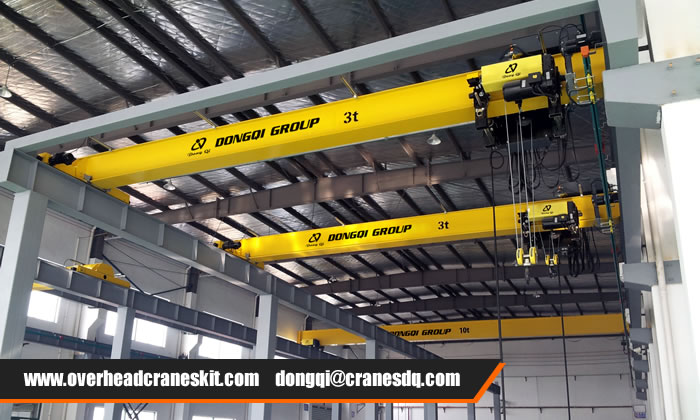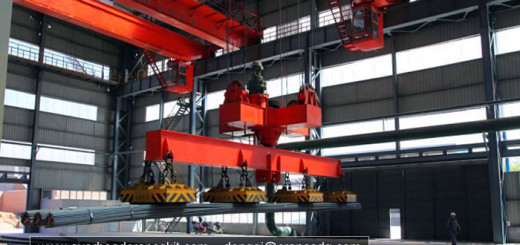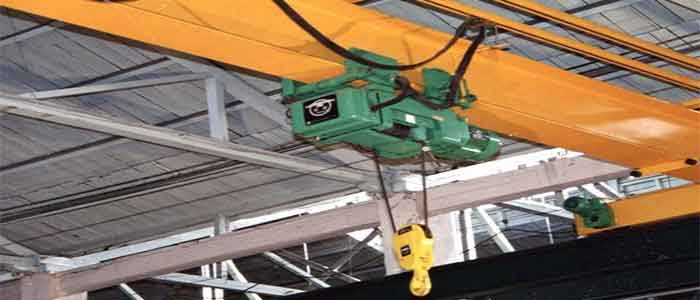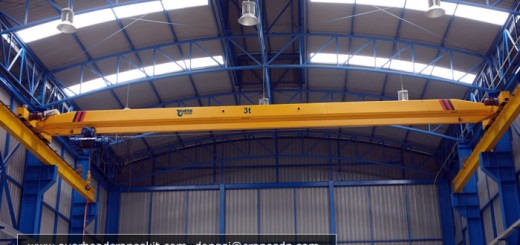How to operate overhead crane accurately | Overhead Crane Knowledge
An overhead crane, commonly called a bridge crane, is a type of lifting crane found in industrial environments. An overhead crane consists of parallel runways with a traveling bridge spanning the gap. A hoist, the lifting component of an overhead crane, travels along the bridge.

Dongqi Group Low clearance overhead crane in application
No matter single girder or double girder overhead crane, they are used frequently in the workshop and factory. So how to operate overhead crane accurately becomes a question and need us to pay attention to it. In order to keep a safety working condition, there are some policies need to be observe.
1.Checking before lifting
- The Materials’ packing and some loose parts need to be removed before lifting them and keep there is no parts falling down during lifting.
- Checking the situation of the sling and hoisting rope to ensure they are good enough to lift.
- Make sure that the weight of the goods should satisfy with the lifting capacity of the overhead crane.
- The safety device and indicating instrument of the overhead crane should be complete.
2.Moving during lifting
- Keep overhead crane moving smoothly and avoid the abrupt and jerky movements during lifting.
- When lifting materials, avoiding everyone close to the hoist hook, sounds a bell and then start to hoist slowly.
- Ensure that nothing obstructs the movement of a load
- Strictly follow the signals to operate the crane except the emergency stopping situation.
- Keep no links or catches on the load while lifting or travelling.
- Lifting operation should be according to the technological requirements of the appearance of the weight, center of gravity and choose lifting point, the lifting point should be selected and the weight of the center of gravity in the same vertical line.
- It is strictly prohibited the weight hanging in the air for a long time. When meet abrupt faults in the operation, crane operator should take some measures to lay the goods down to a safe place, and close the engine or cut off the power to check and maintenance the crane. In a sudden power failure, the operator shall be immediately pulled all controller to zero, disconnect the power master switch, and take measures to reduce weight to the ground.
3.When leaving the crane
- Remove the items from the hook of the overhead crane.
- Raise all hooks to a mid-position.
- Stop the overhead crane at the location which is safe and designated.
- Keep all controllers in the “off” position before closing the main switch.
4. What should be avoided during crane operation
- Keeping nothing in your hands when climbing the ladders. Items that are too large to go into pockets or belts should be lifted to or lowered from the crane by rope.
- When the switches of the crane are broken or out of order, the operator should stop operating the overhead crane.
- Do not lift a load from the side. Centre the crane directly over the load before hoisting to avoid swinging the load.
- Do not allow anyboday to ride on a load or hooks.
- Do not pass the items over the workers.
- Walking on the crane runway is not allowed.
- Do not leave suspended loads unattended.
- Do not engage in any activity that will divert your attention.
- Do not lift, lower, or transport a load with the crane or hoist until all personnel are clear of the load and the load’s path.
- Do not lift, lower, or transport personnel by means of the crane, hoist, trolley, hoist hook, or load.
- Avoid unnecessary inching and quick reversals of direction.
- Avoid swinging of the load or hoist hook when the bridge trolley or hoist is travelling.
Dongqi Group is always stand on your side and anxious customer need, want to customer need, all customer’s benefits. If you want to know more information, please feel free to contact us.
Email: [email protected]
Web: www.overheadcraneskit.com




